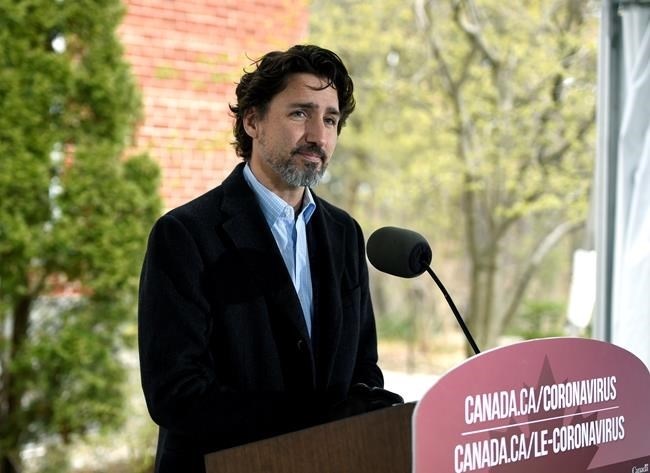
Prime Minister Justin Trudeau listens to a reporter's question during his daily news conference on the COVID-19 pandemic outside his residence at Rideau Cottage in Ottawa, on Saturday, May 9, 2020.
Image Credit: THE CANADIAN PRESS/Justin Tang
May 09, 2020 - 3:30 PM
Federal officials stressed the dangers to long-term care residents and Indigenous communities if COVID-19 restrictions are lifted too quickly after projections in Quebec painted a dire picture of the potential cost.
Prime Minister Justin Trudeau said Saturday he is "very worried" about residents of Montreal, the epicentre of the COVID-19 pandemic in Canada, where the province is preparing to loosen confinement measures despite a rash of fatal outbreaks at nursing homes.
"We must make sure that we are ensuring protection of our older citizens as an absolute priority," Trudeau told reporters.
"I understand the economic pressures we're all under and I understand people do want to go outside. But we need to do it in ways that we are sure are going to keep people safe, because the last thing that people want is a few weeks from now (is) being told, 'OK, we loosened the rules and now COVID's spreading again and you're all going to have go inside for the rest of the summer.'"
The comments came less than 24 hours after Quebec's public health institute said deaths could soar to 150 a day in the greater Montreal area if physical distancing measures are lifted. New cases could mushroom to 10,000 by June amid a potential surge in hospitalizations.
Premier Francois Legault said this week that elementary schools, daycares and retail stores with outdoor entrances in Montreal can reopen May 25 — the second time he has pushed back the date, but ahead of other large cities.
Federal officials remain concerned about a rising death toll.
"I'm afraid of more people dying and more outbreaks," said Dr. Howard Njoo, the country's deputy chief public health officer.
Long-term care residents account for more than 80 per cent of deaths caused by the virus across Canada despite making up only one in five cases, chief public health officer Dr. Theresa Tam said.
Stricter measures "may have to be reinstated" if controls ease up too soon, she said.
"The virus has not disappeared from the face of the earth," Tam said.
Questions about access to supplies are emerging among other vulnerable populations as health officials and community leaders work to contain spread of COVID-19 in Saskatchewan's far north.
The region has seen a spike in cases in and around the remote Dene village of La Loche, a community of 2,800 about 600 kilometres northwest of Saskatoon, where an outbreak has affected more than 100 residents.
Leonard Montgrand, the regional representative of Metis Nation-Saskatchewan, said Friday the situation is getting scary because infrastructure isn't set up to respond to the crisis.
Indigenous Services Minister Marc Miller said outbreaks of COVID-19 in First Nations communities may have been delayed because of their remoteness, but the government needs to remain vigilant in the future.
"You could see languages disappear," he said, referring to elders who make up the last generation to speak an Indigenous dialect.
"First Nations, Inuit and Metis communities have done an incredible job in responding and preventing outbreaks. Their collective work in this is critical and our commitment to support them in making sure they have what they need and are able to continue to protect their community members remains steadfast," Miller said.
He cited a need for better data collection to help protect the communities and understand the spread of the virus among Indigenous people, and called on provincial governments to help in that area.
The full scope of the outbreak among Indigenous populations remains unknown because federal data collection is carried out mainly among on-reserve and northern communities, he said.
Canada's case count climbed over 67,000 on Saturday. Quebecers make up more than half of the total cases (36,986), and about half of those are in Montreal.
On top of sustained community transmission in pockets of the city, long-term care homes have come under such strain that 1,350 Canadian Forces soldiers will be deployed to 25 facilities by mid-May to help residents, the federal government says.
"They're dying in indignity in vast numbers. And that will continue if there are measures that are relaxed too soon. That is the scientific conclusion," Miller said.
Meanwhile, Trudeau says Canada will not pay the full price for medical masks that do not live up to medical standards.
On Friday, the federal government suspended shipments of N95 respirators from a Montreal-based supplier after about eight million of the masks made in China failed to meet specifications.
Trudeau said the move speaks to the government's "rigorous verification system" overseen by the Public Health Agency of Canada.
"We will not pay the full price for masks that we will not be able to use," he said.
The news Saturday was a bit better in Ontario, where Premier Doug Ford announced they will reopen provincial parks Monday after one of the lowest daily case counts (346) in recent weeks.
This report by The Canadian Press was first published May 9, 2020.
—With files from Stephanie Taylor and Teresa Wright
News from © The Canadian Press, 2020